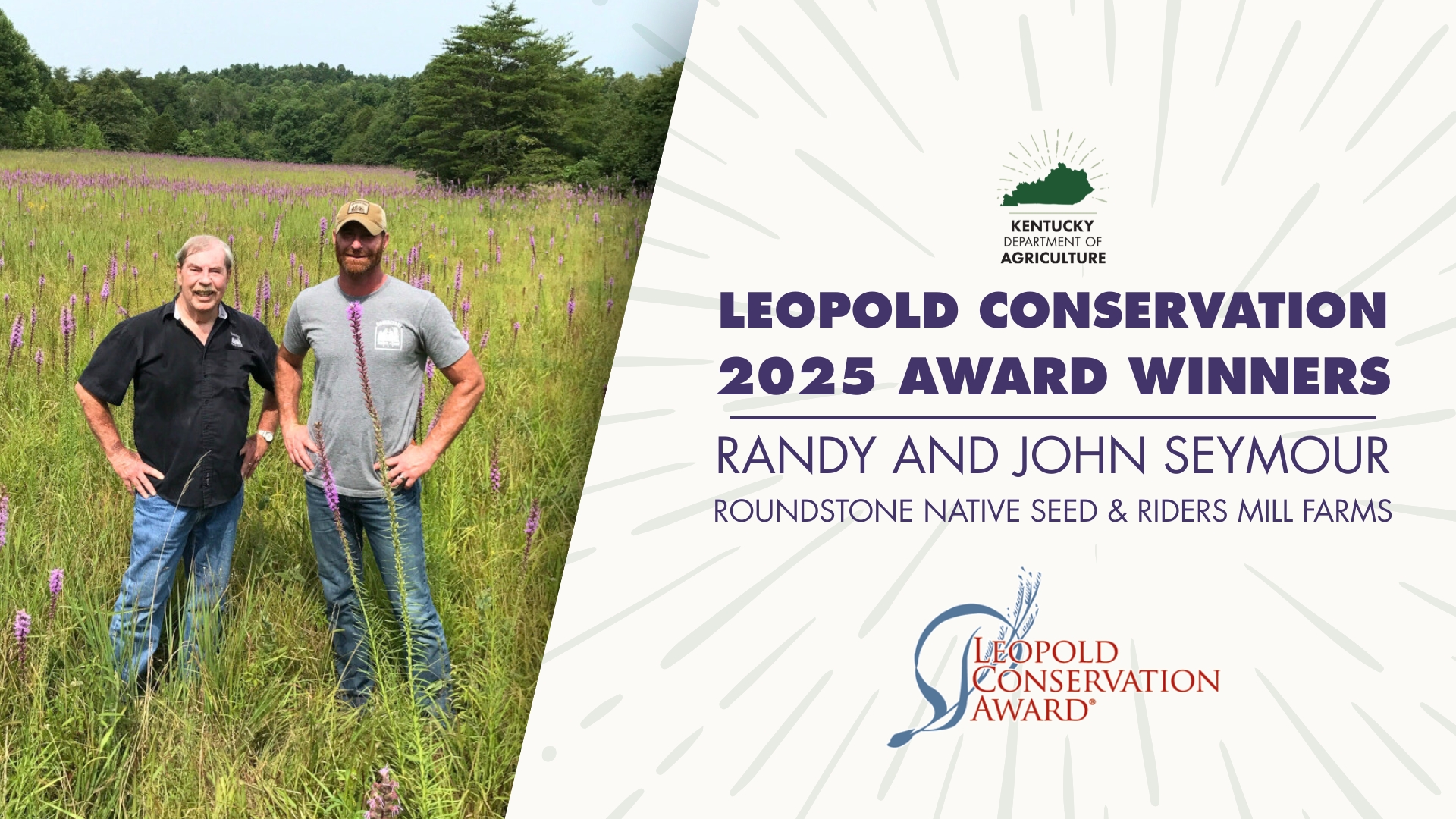
Hart County farmers honored with conservation award
Leopold Conservation Award honors environmental improvement
FRANKFORT, Ky. (Aug. 7, 2025) – Randy and John Seymour, a father-son team who own Riders Mill Farms and Roundstone Native Seed LLC in Upton, are the recipients of the 2025 Kentucky Leopold Conservation Award. The award honors farmers, ranchers, and forestland owners who go above and beyond in the management of soil health, water quality, and wildlife habitat on working land.
“Some of the world’s best conservationists are farmers,” Agriculture Commissioner Jonathan Shell said. “This award is given to those who show the great stewardship for our agricultural lands. Randy and John Seymour not only showed an enthusiasm for conservation and restoration, but a passion for restoring our lands with native seeds. It is this dedication and forethought that will inspire and help generations of farmers to come. Congratulations to them on an honor well deserved.”
The Hart County farmers were presented with the award at the Kentucky Association of Conservation Districts’ Annual Convention on Aug. 5. They received $10,000 for being selected.
Sand County Foundation and national sponsor American Farmland Trust present Leopold Conservation Awards to landowners in 28 states. In Kentucky, the award was presented with the Kentucky Agricultural Council, and the Kentucky Association of Conservation Districts.
“The Kentucky Agricultural Council is proud to once again partner in recognizing exceptional stewardship and conservation work as demonstrated by the Seymour family,” said Tod Griffin, Kentucky Agricultural Council’s chair. “The winner of the 2025 Leopold Conservation Award represents lifelong work to promote good stewardship in their farming operation and also through their agribusinesses, Roundstone Native Seed Company, that works to spread that stewardship nationwide.”
“Kentucky’s 121 conservation districts promote the sound management of all our natural resources, and we are excited to join in recognizing the well deserving Seymour family,” said Allan Bryant, Kentucky Association of Conservation Districts President. “This year’s Kentucky Leopold Conservation Award recipient is truly a working family farm and native seed business with a strong land stewardship ethic.”
Given in honor of renowned conservationist Aldo Leopold, the award recognizes farmers and forestland owners who inspire others with their dedication to environmental improvement. In his influential 1949 book, A Sand County Almanac, Leopold called for “a land ethic,” an ethical relationship between people and the land they own and manage.
Kentucky landowners were encouraged to apply, or be nominated, for the award this year. Applications were reviewed by an independent panel of agricultural and conservation leaders from Kentucky. Among the many landowners nominated for the award were finalists Steve and Melanie Kelley of Carlisle County, and Dr. James “Greg” Kuhns of Bullitt County.
About Randy and John Seymour
Former tobacco fields, overgrown forests, and limestone outcroppings usually are not the makings of a conservation showplace. That is, unless you are talking about the father and son team of John and Randy Seymour.
Their original plan was to raise beef cattle, grow tobacco and row crops, and pursue timber production on land where others had struggled to make a living in remote northwest Hart County. The ravaged land was gullied and stripped of soil nutrients. Quality timber had been selectively stripped. Small, abandoned farms had been sold to others on speculation. Neglect had left the area ecologically damaged.
Undeterred, the Seymours spent four decades piecing together 28 parcels contoured with rolling hills, narrow valleys, and sandstone capped ridge tops into a 2,150-acre tract named Riders Mill Farms.
The Seymours dug 16 ponds to water cattle and protect the water quality of Roundstone Creek. Fences were built to protect the forest from cattle, and soil conditions were improved. They invested resources to control invasive species and repair severe erosion, and managed woodlands for timber production with the assistance of the Kentucky Division of Forestry.
Despite these conservation advancements, the Seymours were intrigued by protecting rare and threatened plants species and creating habitat for diverse and abundant wildlife populations. By prioritizing their farm’s diverse flora and fauna they saw an opportunity to diversify their income stream.
Abundant remnants of native grass, legumes, and wildflowers indicated the site would be ideal for their production. A survey of the farm’s flora found over 900 species. Each was collected, mounted, labeled, peer-reviewed, and included in an on-site herbarium for public study.
Roundstone Native Seed LLC (RNS) was established to specialize in growing seeds native to an ecologically distinct region. With more than 340 species in their seed catalog, the business helps other landowners establish native plants that reduce erosion, build soil health, and improve water quality.
A large demand comes from agencies and organizations that collect seeds from their own properties and send them to RNS to be cleaned and conditioned. RNS coordinates with other area landowners to grow seed under contract. In addition to native seeds an average of 500 acres of soybeans and oats are grown each year.
Riders Mill Farms contains a cave that serves as a maternity site for 36,000 gray bats, a federally listed endangered species. The Seymours vigorously protect the cave, closing it to only biologists from April through October.
The Seymours have an agreement with Kentucky Department of Fish & Wildlife to provide public fishing access along a half mile of Roundstone Creek, which the agency stocks with trout. They also host long-term studies of reptiles and amphibians in collaboration with conservation organizations and universities.
More than 100 acres have been restored as oak savanna at the farm, which has served as a release site with habitat for Ruffed Grouse. The Seymours also partnered with neighbors to provide a 5,000-acre protection zone for turkey.
In 2024, they hosted an event with the University of Kentucky that attracted more than 100 forestland owners interested in conservation. It’s proof that their willingness to share innovative native plant propagation methods has spread the Seymours land ethic far beyond their remote, but rejuvenated piece of Hart County.
For more information on the award, visit www.leopoldconservationaward.org.

